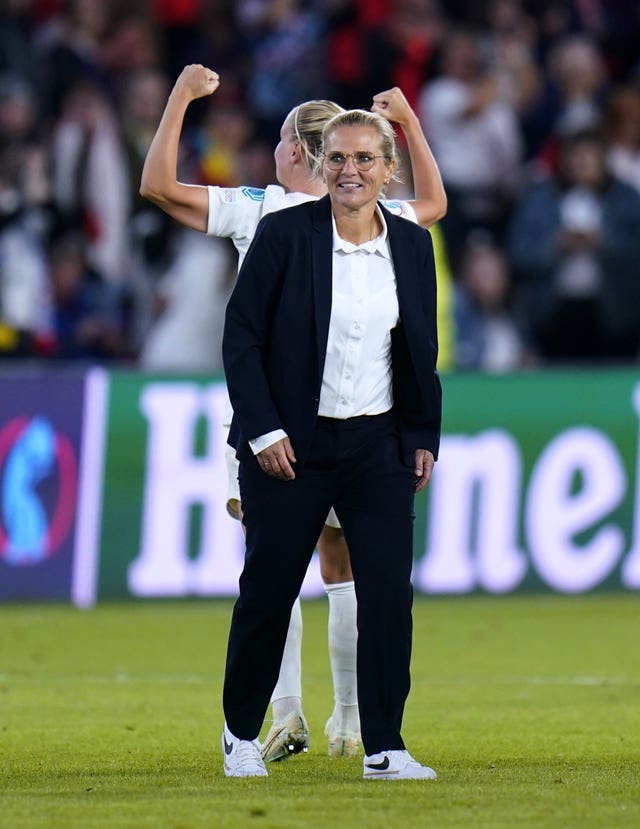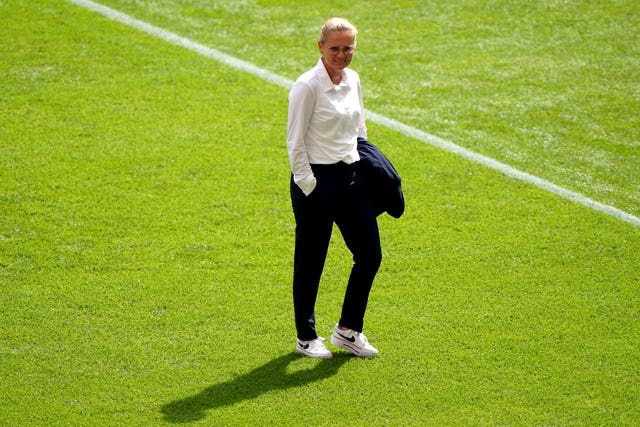Steely Sarina Wiegman calmly steers England’s Lionesses to Euro 2022 glory
England’s extra-time win over Germany meant back-to-back Euro trophies for Wiegman who coached Netherlands to victory in 2017.

If imitation really is the sincerest form of flattery then surely Sarina Wiegman’s suit says it all.
The England head coach claimed a second consecutive women’s Euro trophy on Sunday, having guided her native Netherlands to glory in 2017.
Britain has exponentially taken notice of the steely blue-eyed woman who has guided the Lionesses to glory, surpassing even some of her own squad to become one of the most recognisable faces at this tournament.
That fashion editors have been telling admirers where to get hold of her pitch-side uniform, a dark £45 M&S blazer with matching trousers, paired with a white shirt and Nike trainers, says a lot about how quickly the 52-year-old’s stock has risen since she took the helm last September.

“She looks calm, she looks cool, I’ve heard players talk about how honest she is with them,” former Lioness Kelly Smith, who earned 117 caps for England, told the PA news agency.
“There’s no BS, which some managers can give you. She’s just, ‘this is what you need to do. If you don’t do this, then potentially you won’t play, I need to see this from you’. It’s very to the point, and I think the players have never had that before.
“And they’re liking it, that it’s kind of basic, but they’re taking it on board. They just seem so unified and united.”
The ‘Sarina suit’ was not the first significant style choice the former PE teacher has made over the course of her remarkable, record-breaking, glass ceiling-shattering career.
Before the trophies, the accolades, and this weekend’s trip to the ‘home of football’ came ‘The Haircut’.
There were no girls’ teams available when Wiegman first started playing in hometown the Hague, but mixed-gender sides were forbidden. Determined, the future FIFA Best Women’s Coach winner — the only woman to hold the title twice — chopped off her hair to better blend in with her twin brother and the boys.
“Sometimes, when people saw I was a girl, they made trouble,” she wrote in The Coaches’ Voice.
“Other times we got nice reactions. But most of the time it was hard to play.”
Wiegman’s breakthrough came at 16, when she was first selected for the Dutch national team and whisked away to China to play in a proof-of-concept tournament for a future Women’s World Cup.
There, she met US women’s national team coach Anson Dorrance, who also led the women’s setup at the University of North Carolina. It did not take much to convince Wiegman, then frustrated with the Netherlands’ commitment to women’s football, to take her next steps Stateside.
She wrote: “In the Netherlands, it felt like we were always fighting for our place. Like we weren’t accepted. I wanted more and I knew that, in the US, things were better.”
Unfamiliarity gave way to comfort, then confidence, as Wiegman realised there were others like her, pushing for more and better in the game she loved. It instilled a sense of ruthlessness — a descriptor that has followed Wiegman to this day — in the young footballer.
She would go on to become the Dutch women’s team’s first centurion, earning 104 caps alongside two domestic titles with Ter Leede before retiring in 2003, when she began to balance PE teaching with coaching.
The mother of two was recruited by ADO Den Haag in 2007 to lead their newly-formed Eredivisie Vrouwen side, a job she insisted on only taking if it was made full-time. Seven years later she was back in the national team setup, this time as head coach Roger Reijners’ assistant.
She also worked as a coaching intern with men’s side Sparta Rotterdam whilst on her Pro License course, making Wiegman the first woman to coach with a Dutch men’s professional club.
Wiegman was handed the Netherlands’ top job permanently in 2017, just six months before she would guide the hosts to home Euros victory — the sea of orange-clad supporters, who have made their presence loudly known here this summer, a testament to how far the game had come and her role in it.

But behind the crisp button-down is someone with a wry smile and an understated sense of humour, a woman who recently burst into giggles when asked if she was a ‘serial winner’ and has looked increasingly exuberant and generous with hugs after each final whistle.
The jacket was off and the shirt sleeves hitched up for Sunday’s final at a red-hot Wembley, but the businesslike approach remained – along with a traditional Wiegman result.





